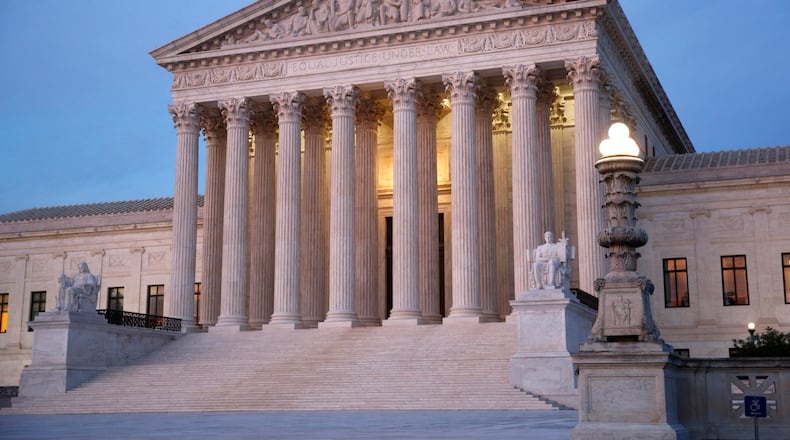U.S. Supreme Court justices appeared divided Tuesday on a Georgia man’s argument that a decades-old civil rights law protects millions of gay, lesbian and transgender Americans from discrimination in the workplace.
Gerald Bostock claims he was fired from his job in Clayton County because he is gay. His case was one of three the high court heard Tuesday, setting the stage for what could be their first gay rights ruling with a new, solidly conservative majority.
The court’s four liberal justices appeared favorable to the arguments made by the attorney for Bostock and Donald Zarda, a late skydiving instructor from New York whose estate contends he was fired for telling a client he was gay. Separately, they heard from an attorney for Aimee Stephens, a transgender woman who was fired from her job at a Michigan funeral home after telling her boss she was transitioning from male to female.
But all eyes were on President Donald Trump's two Supreme Court nominees, Justices Neil Gorsuch and Brett Kavanaugh, who were hearing their first gay rights case since their confirmations.
While Kavanaugh spoke little at Tuesday’s oral argument, Gorsuch asked questions that suggested he could ultimately be the deciding vote on the three cases.
A jurist known for a strict interpretation of the text of the law, Gorsuch said he saw how sex could be a “contributing” cause for LGBTQ people who have been fired. He told Stephens’ attorney, “I’m with you on the textual evidence.” But Gorsuch also worried about any “massive social upheaval” that could result from the court issuing a broad ruling and not letting Congress decide the issue.
“It’s a question of judicial modesty,” he said.
But Justice Sonia Sotomayor, speaking from the court's liberal wing, said action could be needed to protect groups that have been disenfranchised.
“We can’t deny that homosexuals are being fired merely for being who they are and not because of religious reasons, not because they are performing their jobs poorly, not because they can’t do whatever is required of a position, but merely because they’re a suspect class to some people,” Sotomayor said. “At what point do we say we have to step in?”
Later in the day, one of Bostock’s lawyers said he felt “very confident” in the arguments his side presented to the court.
“We feel they are grounded in the text of the law and Supreme Court precedent and very firmly so,” said Thomas Mew. “We certainly hope the court sees it that way as well.”
Bostock was also in the courtroom for Tuesday's proceedings, which he described as "surreal."
“On my journey with this I have learned that it’s so much bigger than me,” he said. “People shouldn’t be fearful of going to work, that they’re going to lose their job because of who they are, how they identify or who they love.”
Congress’ job?
Three Georgia Congressmen, Republicans Jody Hice of Monroe, Rick Allen of Evans and Doug Collins of Gainesville, signed onto a legal brief this summer opposing Bostock’s view.
The Civil Rights Act “has not been judicially interpreted to include sexual orientation and gender identity until recently, and legislative attempts to modify (law) to include them are ongoing,” the group wrote. “Consequently, this Court should refrain from judicially circumventing the legislative process.”
Justice Samuel Alito on Tuesday indicated he was sympathetic to that argument, which was similar to those made by Clayton County and the Trump administration.
“Congress has declined or failed to act on these requests,” Alito said. “And if the court takes this up and interprets this 1964 statute to prohibit discrimination based on sexual orientation, we will be acting exactly like a legislature.”
The House passed the Equality Act, which would codify federal civil rights protections to the LGBTQ community, this summer but the legislation has not advanced in the GOP-controlled Senate. Georgia doesn't have a law on the books prohibiting discrimination based on sexual orientation.
Solicitor General Noel Francisco said “sex and sexual orientation are two different traits” and that elected members of Congress were better suited to weigh in on such a political issue, as legislators have done in nearly two-dozen other states, and balance it with ‘religious liberty’ concerns.
Stanford Professor Pamela Karlan, who argued for Bostock and Zarda, said there is “no analytic difference” between discrimination based on a person’s sexual orientation and other “forms of discrimination that have been already recognized by every court.” She pointed to a 1989 Supreme Court ruling that held that gender stereotyping is a form of sex discrimination, and said that Bostock and Zarda’s employers relied on a stereotype that all men should be interested in women.
Over and over again, justices returned to what Congress meant when it banned sex discrimination in the 1960s. At the time, Justice Ruth Bader Ginsburg noted, same-sex relations were a criminal offense in most states and the American Psychiatric Association labeled homosexuality a mental illness.
Tuesday's cases were the first major gay rights cases considered by the court since the retirement of Anthony Kennedy, who authored the most significant LGBTQ rulings of the last two decades, including overturning a Texas law that criminalized sodomy in 2003 and legalizing same-sex marriage in 2015.
Bostock, who lives in Doraville, ran a court volunteer program in Clayton County said he was fired after he joined a gay Atlanta softball league. Clayton officials said an audit showed he mishandled county funds, a charge he denies. Jack Hancock, a lawyer for the county, said “Mr. Bostock’s sexual orientation had nothing to do with his termination.”
A ruling is expected in the cases next summer.
About the Author
Keep Reading
The Latest
Featured







